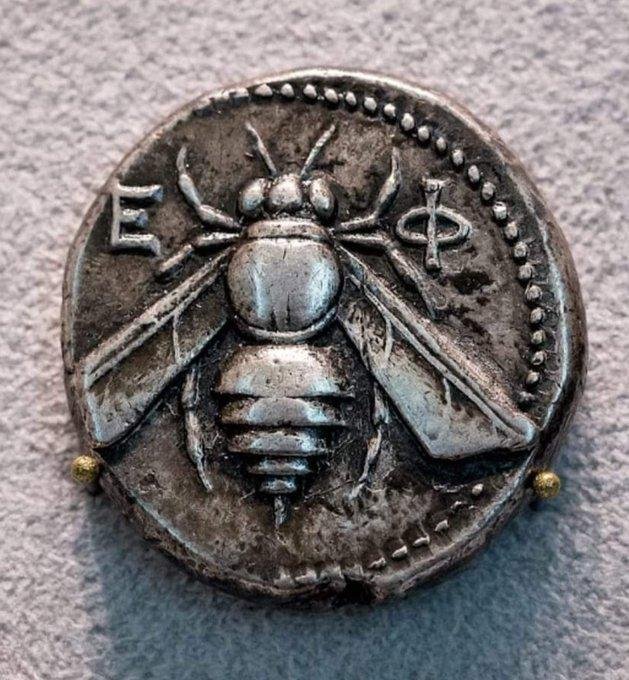In ancient Greece, bees (mélissa) The Sacred Bee -, were considered sacred messengers of the gods, particularly by the Muses, goddesses of art, poetry and science
The muses sent bees to humans, ordering them to smoother their lips with honey (μέλι - méli), in order to bring them wisdom and eloquence.
Greek myth Zeus’s father, Kronos, wanted to kill him even before he was born, so his mother, Rhea, switched the infant with a rock, which Kronos then swallowed whilst she spirited the infant Zeus away to a secret cave on Mt.Dikte, on the island of Crete.
There are various versions about what happened next, one has Zeus raised in a cave full of honeybees, which he later rewarded by giving them their golden colour.
Another version is that nymph Melissa (goddess of honey and beekeeping), feeds baby Zeus honey from sacred bees and gives him milk from a goat named Amaltheia, which, in yet another version is a goat-tending nymph, who reared Zeus.
Which version you prefer, Zeus, king of the Olympian gods, was raised on honey.
Hippocrates (466 - 377 BC), "Father of medicine", was a great believer in the power of honey as the go to remedy for soothing most ancient ailments.
Aristotle (384 - 322 BC) The great Greek philosopher, wrote about the art of beekeeping in his first book, "Historia Animalium" (The History of Animals). At the time of writing his book, people believed bees did not produce their young but found them in flowers but Aristotle thought they developed within honeycomb cells. He never did figure out though, how bees made honey and decided it came from the atmosphere.
The author of the Iliad and the Odyssey Homer, goes into great detail about searching for wild honey amongst the rocks. At the Olympic Games in ancient Greece, athletes drank honey water in order to regain their strength. Pythagoras, the ancient mathematician, considered honey the elixir of youth, to consume it was the sure-fire way to longevity.
The muses sent bees to humans, ordering them to smoother their lips with honey (μέλι - méli), in order to bring them wisdom and eloquence.
Greek myth Zeus’s father, Kronos, wanted to kill him even before he was born, so his mother, Rhea, switched the infant with a rock, which Kronos then swallowed whilst she spirited the infant Zeus away to a secret cave on Mt.Dikte, on the island of Crete.
There are various versions about what happened next, one has Zeus raised in a cave full of honeybees, which he later rewarded by giving them their golden colour.
Another version is that nymph Melissa (goddess of honey and beekeeping), feeds baby Zeus honey from sacred bees and gives him milk from a goat named Amaltheia, which, in yet another version is a goat-tending nymph, who reared Zeus.
Which version you prefer, Zeus, king of the Olympian gods, was raised on honey.
Hippocrates (466 - 377 BC), "Father of medicine", was a great believer in the power of honey as the go to remedy for soothing most ancient ailments.
Aristotle (384 - 322 BC) The great Greek philosopher, wrote about the art of beekeeping in his first book, "Historia Animalium" (The History of Animals). At the time of writing his book, people believed bees did not produce their young but found them in flowers but Aristotle thought they developed within honeycomb cells. He never did figure out though, how bees made honey and decided it came from the atmosphere.
The author of the Iliad and the Odyssey Homer, goes into great detail about searching for wild honey amongst the rocks. At the Olympic Games in ancient Greece, athletes drank honey water in order to regain their strength. Pythagoras, the ancient mathematician, considered honey the elixir of youth, to consume it was the sure-fire way to longevity.
In ancient Greece, bees (mélissa) The Sacred Bee -, were considered sacred messengers of the gods, particularly by the Muses, goddesses of art, poetry and science
The muses sent bees to humans, ordering them to smoother their lips with honey (μέλι - méli), in order to bring them wisdom and eloquence.
Greek myth Zeus’s father, Kronos, wanted to kill him even before he was born, so his mother, Rhea, switched the infant with a rock, which Kronos then swallowed whilst she spirited the infant Zeus away to a secret cave on Mt.Dikte, on the island of Crete.
There are various versions about what happened next, one has Zeus raised in a cave full of honeybees, which he later rewarded by giving them their golden colour.
Another version is that nymph Melissa (goddess of honey and beekeeping), feeds baby Zeus honey from sacred bees and gives him milk from a goat named Amaltheia, which, in yet another version is a goat-tending nymph, who reared Zeus.
Which version you prefer, Zeus, king of the Olympian gods, was raised on honey.
Hippocrates (466 - 377 BC), "Father of medicine", was a great believer in the power of honey as the go to remedy for soothing most ancient ailments.
Aristotle (384 - 322 BC) The great Greek philosopher, wrote about the art of beekeeping in his first book, "Historia Animalium" (The History of Animals). At the time of writing his book, people believed bees did not produce their young but found them in flowers but Aristotle thought they developed within honeycomb cells. He never did figure out though, how bees made honey and decided it came from the atmosphere.
The author of the Iliad and the Odyssey Homer, goes into great detail about searching for wild honey amongst the rocks. At the Olympic Games in ancient Greece, athletes drank honey water in order to regain their strength. Pythagoras, the ancient mathematician, considered honey the elixir of youth, to consume it was the sure-fire way to longevity.

